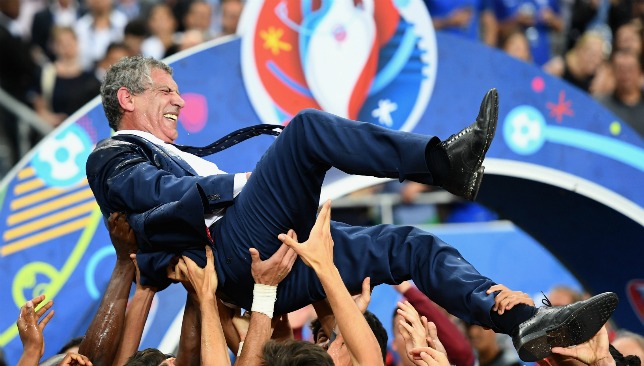
It was English football’s great anti-intellectual Harry Redknapp who once said of management: “The truth is, it is all about players, and if you have good players then this job is not that difficult.”
Granted, Portugal have possessed one of the two best players in the world for the last seven years, but there was little in their squad to suggest at the start of Euro 2016, bar a mediocre group, they were champions-in-waiting.
That view was only enhanced during a turgid opening round where they failed to beat Iceland, then Austria before conceding three goals to Hungary. On June 22, Ronaldo or not, this was not a team ready to be continental kings.
Which is why their victory at the Stade de France on Sunday is a triumph for coaching and the work of Fernando Santos, who superseded Ronaldo – no mean feat in itself – to become the most important individual in that Portugal squad.
International football management must be a curious task as you’re working with a small group of players – with maybe 10-15 of the same faces – for around six weeks in non-tournament years.
History ❤️❤️ pic.twitter.com/7FAK9kbWUC
— Cristiano Ronaldo (@Cristiano) July 11, 2016
These players are drawn from a multitude of clubs – 16 in Portugal’s case – so therefore are accustomed to a number of different training exercises, tactical approaches and come from very different dressing rooms, in terms of atmosphere and team dynamic with a whole range of personalities.
It’s why, against this fractured and complicated backdrop, the coaches who tend to succeed at international level, are the ones who can foster the best teamwork.
Marc Wilmots has dined out on the individual brilliance of the stars within his Belgium team for four years but when it’s come to the crunch in major tournaments, the faultlines that have always existed have been brutally revealed.
With every Belgian defeat, members of the squad were lining up to point the finger of blame at their coach. That’s not the work of a man who has created a unified squad behind one common goal.
It was the same with England; Roy Hodgson reduced from a previously well-respected manager to a figure of fun amid leaks from within the camp at his apparent archaic training methods.
At the other end of the scale, it says a lot about Joachim Low and Didier Deschamps’ standing among their players that despite their own failures – albeit of a slightly lesser magnitude – little to no criticism has, so far, come from within.
As his rivals fell by the wayside, though, Santos was the last man standing with yet another divine defensive performance to keep the tournament’s best attack at bay.
Critics will point to the fact Portugal are European champions having won just one of their seven games inside 90 minutes.
Ignoring the uniqueness of tournament football, that’s looking at things from the wrong way; Portugal are European champions having gone seven games unbeaten.
It may be a sad indictment of football in the modern age that a team blessed with attacking players of the potency of Ronaldo, retreated to a pragmatic style but then you weren’t paying attention during the group stage.
Wow 👀👀👀 pic.twitter.com/nF6BJPZYJp
— Cristiano Ronaldo (@Cristiano) July 11, 2016
A simple statistic to emphasise the change of approach is that during the three group games Ronaldo took 30 shots at goal; in the preceding four knockout matches (admittedly with just 25 minutes in the final) he attempted just 15.
For Santos to convince an ego the size of Ronaldo’s to take a backseat and assume a secondary role to that of the collective, is quite an achievement. But that reveals not only Ronaldo’s own selflessness, but the skill of Santos to have recognised where his team’s true strengths lay – in defence and a midfield unit of hard-working and industrious players – then convey his message with little opposition.
Every successful coach is, to some extent, a lucky one, and had Antoine Griezmann taken at least one chance or Andre-Pierre Gignac rolled his shot inside, rather than onto the post, then we would perhaps be bemoaning about what a missed opportunity it was for Ronaldo and the Seleccao.
But while Redknapp’s not necessarily wrong, as the best teams throughout history have tended to contain the world’s best individuals, Portugal have shown football very much remains a team game and why having a good coach can take you to special places.
24 teams, 51 games, 108 goals.
— UEFA EURO 2016 (@UEFAEURO) July 10, 2016
One new champion! #EURO2016 pic.twitter.com/OZ4pQMGvUC